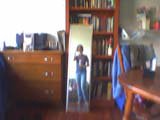Literary theory becomes philosophy when you start to ask who has authority to interpret the text, when that very question leads you to broaden your understanding of what a text is. All of the sudden you find yourself talking about the meaning of life and something much more important than who or what has the agency, the means to interpret or communicate meaning, however small or large. Even the distinction between "small and large" become complicated when one takes into account contingency.
It seems horribly convoluted, as we, the always-already-in-an-interpretive-state beings, question being, question meaning.
But it really is quite simple. There is hope in that we, these interpretive beings situated contingently have the ultimate agency, the very awe-some power to create meaning.
There is a challenge locally, at least in the united states, in that we live in a culture of consumption. we are urged to consume rather than create. This is not to say that there is no value in deeply appreciating, being moved by a great work such as a film, a book, a dinner, a tapestry, a conversation -- but the emphasis should be on that verb, moved -- we should be moved to create ourselves and in doing so shape a small but crucial part of the world we inhabit.
What sort of world, what sort of city, what sort of neighborhood would you occupy if every single person drew from on another? What glorious pieces of art would emerge? What unification, solidarity, what sort of passion for social justice, what action to make it a reality would emerge?
Perhaps I have been reading too much Rorty. Perhaps I am drunk with hope.
When I toss out my selfishness, when I spend my time loving others -- even the dead philosophers by reading their work -- I sing with hope. My peers feel called to ministry. Some of my friends do as well.
I feel called to hope.
It is a welcome challenge.
